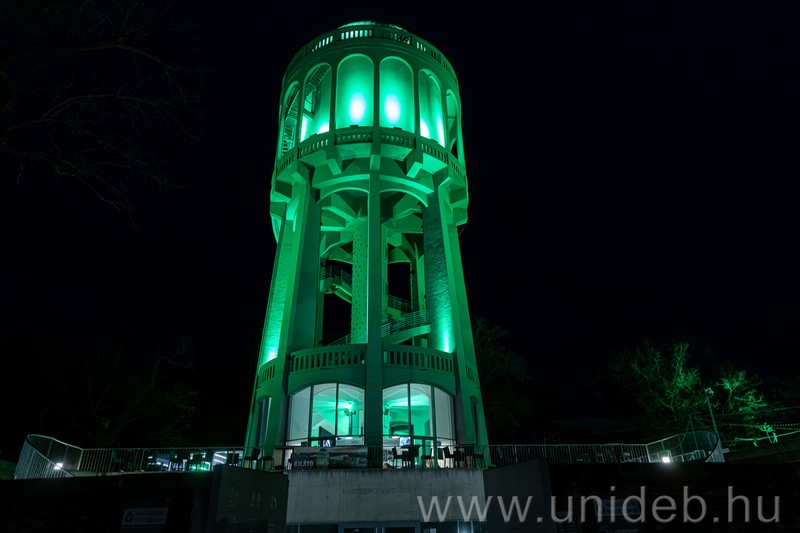Glaucoma is the third most common cause of blindness. However, with treatment started in the early stages of the disease, complete vision loss can be prevented. That is why experts emphasize the importance of screening tests during World Glaucoma Week, between March 10 and 16. In connection with World Health Week, the main building of the University of Debrecen and the Clinical Center were also lit up in green on Tuesday to draw attention to the disease.
Glaucoma usually occurs over the age of 40, with a frequency of about two percent, i.e. two out of a hundred people. However, the incidence of the disease increases with age, every tenth person after the age of 70 struggles with this problem.
Glaucoma is a disease associated with atrophy of the optic nerve, the most common cause of which is high eye pressure. Atrophy of the optic nerve slowly and gradually causes loss of vision, and in the last case, it can lead to blindness. Early recognition of the disease is made difficult by the fact that it does not cause symptoms for a long time, which is why patients do not consult a doctor at all or only late.
The central visual acuity of glaucoma patients is good for a long time, but their vision narrows only at the edges and the periphery. This then gradually worsens, and the loss of vision becomes greater and greater. Patients usually only notice that there is something wrong
– explained Assistant Professor Bernadett Ujhelyi, head of the Glaucoma Department of the Ophthalmology Clinic of the University of Debrecen Clinical Center.
However, the disease diagnosed in the initial stage can be successfully treated, further deterioration can be stopped and total blindness can be prevented. In milder cases of open-angle glaucoma, it may be sufficient to use eye drops to keep the eye pressure in the normal range. The patient must use the eye drops for the rest of his life, under constant supervision. However, if the patient does not respond well to the drop, because, for example, it causes an allergy or a deterioration in the quality of life, then selective laser trabeculoplasty (SLT) may be the solution, which has been available for several years at the Ophthalmology Clinic of the Clinical Center of the University of Debrecen.
If, despite the therapy, the patient’s intraocular pressure remains high or his vision continues to deteriorate, anti-glaucoma surgery may be necessary.
Their characteristic is that we open a new way inside the eye to drain the aqueous humor that most determine eye pressure. Anti-glaucoma surgeries have developed significantly in recent years, and several new procedures are available at the Ophthalmology Clinic. In addition to traditional anti-glaucoma surgeries, we use, for example, the technique where an implant, a hair-thin tube, is inserted under the conjunctiva during the operation, which continuously ensures the drainage of the aqueous humor
– emphasized Bernadett Ujhelyi, assistant professor of Ophthalmology at the Clinical Center of the University of Debrecen.
To provide effective treatment and avoid complete vision loss, experts emphasize the importance of screening tests.
Basic glaucoma screening is available in all general ophthalmology clinics where patients are accepted by appointment. Bernadett Ujhelyi added that those over the age of 40 should make an appointment and go for a screening test, with a family history of glaucoma.
Screenings and the disease are raised worldwide during Glaucoma Week, between March 10 and 16. The University of Debrecen also joined the initiative.
On Monday, the staff of the Ophthalmology Clinic welcomed the patients in green clothes, and on Tuesday evening, the main building of the university and the Clinical Center and the Water Tower were illuminated in green.
(unideb.hu)




















